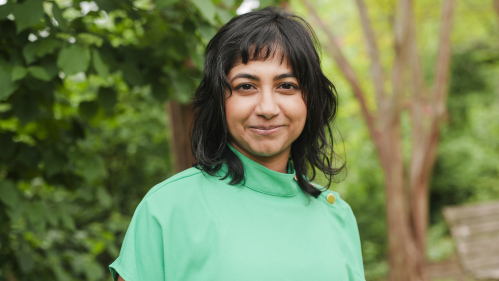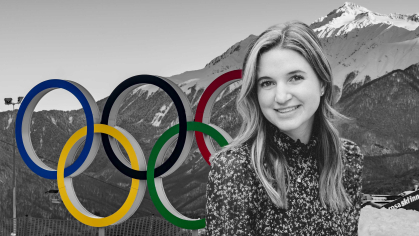Alumna Part of Pulitzer Prize-Winning Team for Wall Street Journal Series on Elon Musk

The Sunday evening before this year’s Pulitzer Prize winners were announced, Wall Street Journal editor Aruna Viswanatha wasn’t in journalist mode. She was in mom mode.
After spending the afternoon watching youth flag football, the 2003 Rutgers College alumna was focused on driving her two kids back to their Arlington, Va., home and prepping for the school and work week ahead. So, when a senior editor in New York City called, Viswanatha let it go straight to voicemail. She figured it was another accidental call because her name starts with an A.
“I didn’t even know we were a Pulitzer finalist or had submitted that package,” she said. “But when the editor followed up with a text and asked, ‘Can you get up here by tomorrow morning?’ I knew something was up.”
While gathered around a giant newsroom TV for a Pulitzer viewing party on May 5 at the Wall Street Journal’s Manhattan headquarters, Viswanatha, 43, and her peers erupted in cheers and shared a champagne toast after learning their series, “Elon Musk Above The Law,” won journalism’s most prestigious award.
“It feels good to be recognized,” said Viswanatha, who was also part of a team that was a finalist for stories about Russia's intelligence agencies and the detention and eventual release of her colleague Evan Gershkovich from a Russian prison.
“This is the one award that people outside of journalism have heard of, so it’s very fun to be a part of.”
The package of stories she and her colleagues researched, wrote and edited throughout 2024, documented how “Musk transformed himself from a Silicon Valley entrepreneur into a fully vested oligarch who puts himself above the law, and a powerful force in U.S. politics, business and government,” according to the Wall Street Journal series introduction.
Originally from Parsippany and Livingston, N.J., Viswanatha, attended Rutgers with her twin sister Veena. She earned a bachelor’s degree in political science and was initially interested in working in the nonprofit and service sector.
After an internship in that field failed to inspire her, she decided to cast a wider net post-graduation. Viswanatha landed a job as a production assistant working on a documentary for PBS and parlayed that into an internship with the Charlie Rose Show before deciding to pursue a master’s degree in journalism from Columbia University. After graduating, she started writing for The American Lawyer, covering law firms in New York City, before taking an overseas assignment in New Delhi, India, as a staff writer for Mint.
Unlike her parents, who emigrated from Southern India and became physicians like many of their peers, Viswanatha said she and her sister were given the chance to find their own paths. A university as large and diverse as Rutgers, she said, was the perfect place to start that process.
“It had so much opportunity. You could do what you wanted and make the most of your time there. But you had to go out and make your own way,” she said. “I interacted with such a broad cross section of people and had such a broad cross section of experiences it helped me to learn to adapt to the things that came after that.”
Viswanatha returned to the States at the height of the financial crisis in 2009 to help her sister plan her wedding. During her job hunt, she found herself gravitating toward roles in Washington, D.C., first covering the Justice Department for Main Justice and later documenting the big banking missteps that led to the Great Recession as a financial crime reporter for Reuters. The Wall Street Journal hired Viswanatha in 2015, where she first worked the financial crime and enforcement beat and later during President Trump’s first term, a broader portfolio that included law enforcement and national security.
She covered the Justice Department and FBI, including the Mueller investigation, China and Russia national security threats and the Jan. 6 investigation.
Covering Trump’s second term has been a whirlwind, said Viswanatha, who ascended to the rank of editor with the Wall Street Journal last year.
“There’s a lot that’s changing very fast. It’s hard to keep up,” she said.
Despite those pressures, and many threats toward mainstream journalists, Viswanatha said she still loves her job and feels a great sense of responsibility to get it right – especially now.
“It’s a hard job, but it’s also one of the most fun jobs. The whole definition of our job is to find stuff that’s interesting and figure out what’s happening,” she said. “It’s hard to feel sorry for ourselves when we have a front row seat to history and get paid to cover it.”


